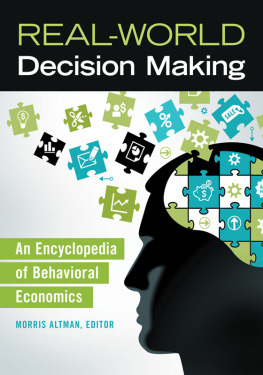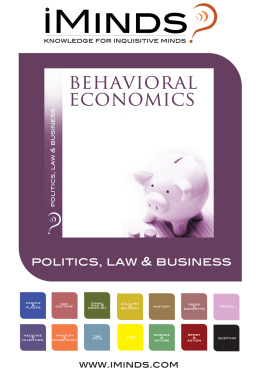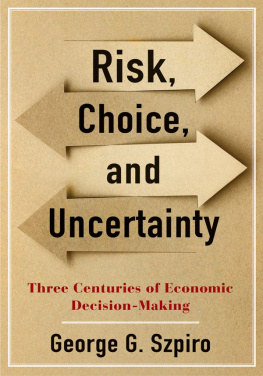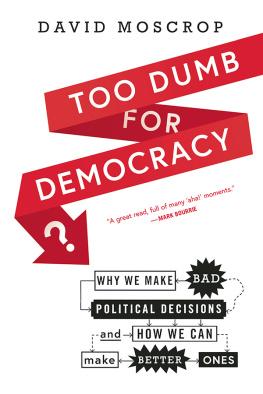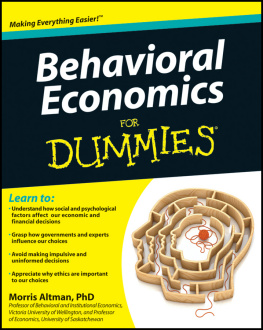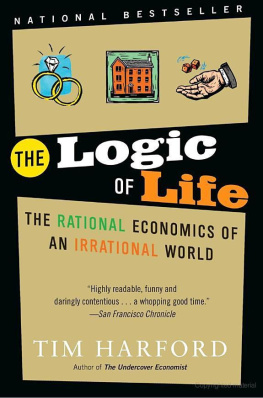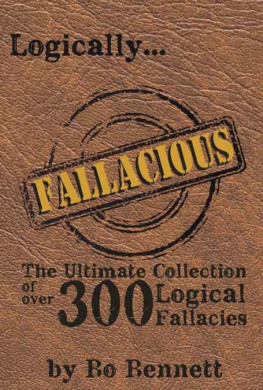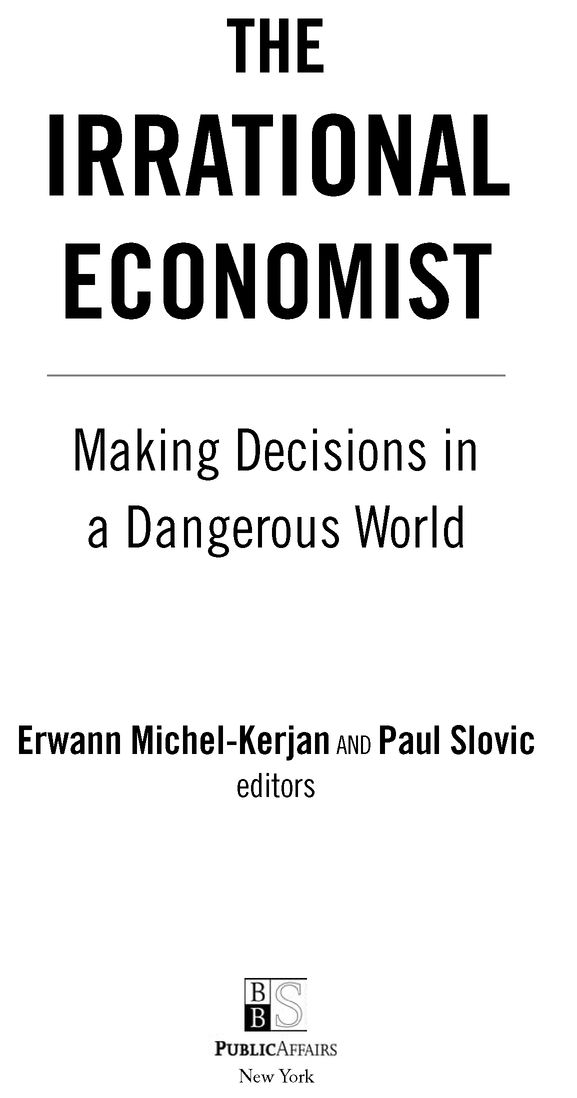Table of Contents
economics (ek-nomiks) -
noun1. a study of mankind in the ordinary business of life (Alfred Marshall, 1890)
2. the social science that analyzes human behavior as a relationship between the production, distribution, and consumption of goods and services.
NOTE TO THE READERS
There is a clear tendency to view our own thoughts, words, and actions as rational and to see those who disagree as irrational.
Introduction
An Idea Whose Time Has Come
ERWANN MICHEL-KERJAN AND PAUL SLOVIC
All the forces in the world are not so powerful as an idea
whose time has come.
Victor Hugo
OUR DANGEROUS AND INTERDEPENDENT WORLD
At a time of immensely consequential choices, it has never been more important to make the right decisions. But how can we be sure we are not making fatal mistakes? How can we be sure we can trust the tools, models, and methods we use to make our decisions?
The Irrational Economist aims to shed light on some important developments in decision making that have occurred in economics and other social sciences over the past few decades, including some of the most recent discoveries. Quite surprisingly, much of the knowledge developed in these fields has yet to be translated from research into actionable decisions in the real world. Our goal in this book is simple: to provide this knowledge in a condensed fashion to help people make better decisions in a world that seems to become more and more uncertainif not more dangerousas time passes.
This last statement may seem controversial. Conventional wisdom holds that crises and catastrophes are not new and that the world has seen many great dangers before. The twentieth century alone witnessed one of the deadliest five-year periods in human history: Between 1914 and 1918, World War I killed over 15 million people. And as the war ended, the 1918-1919 influenza pandemic (commonly referred to as the Spanish flu) spread to nearly every part of the world. The flu killed over 50 million, more than the toll of the Black Death in the fourteenth century. Wars and natural disasters have indeed devastated many parts of the world throughout history. Since the industrial revolution, new types of technological risks and deadly weapons have also emerged.
But one of the hallmarks of the twenty-first century will likely be more and more unthinkable events, previously unseen contexts, and pressure to react extremely quickly, even when we cannot predict the cascading impact our actions might have.
That is because the world has been evolving at an accelerating speed. Physical frontiers between economies are disappearing, as described by Thomas Friedman in his best-selling book, The World Is Flat. Increasingly widespread social and economic activities have turned our planet into an interdependent village. Communication costs are close to zero, goods and people travel faster and more cheaply than ever before, and knowledge is shared with unprecedented ease on the Internet and through emerging social networks. There are many benefits to this process.
Yet the flip side of this extraordinary transformation has been somewhat underappreciated: Actions taken or risks materializing 5,000 miles away can affect any of us very soon thereafter. Viruses fly business class, too! The financial turmoil that started in 2008 is another example; this blew up the theory of decoupling long supported by many theorists who thought a reduction in the United States or Chinas economic growth would not severely affect the rest of the world. Well, as we now know, it didwith profound consequences. We are all interconnected.
The litany of global interdependent risks is almost endless. Events that have surfaced prominently on the social, economic, and political fronts in many countries just since the beginning of 2001 are eye-opening: terrorist attacks; financial crises; global warming; scarcity of water and other resources; hurricanes, floods, tsunamis, heat waves, droughts, earthquakes, and wildfires unprecedented in scale and recurrence; repeated genocides and local wars; nuclear threats; pandemics and new illnesses.
This list is long but hardly exhaustive: We trust that if you think for a moment about what is going wrong today, what you are afraid of, or you simply watch news TV, you shall soon add to this list. And as challenging as it is today on a planet with nearly 7 billion people, it is likely to be even more so as the population continues to grow; ever greater concentrations of people and assets at risk set the stage for truly devastating events to happen.
At the heart of the work that led to this somewhat unusual book is this question: Is the series of untoward events that have occurred since 2001 an omen of what the twenty-first century has in store for us? If soas we believeit is time to think about the future in a fundamentally different way. What does this mean for us, as individuals and families, private companies, government authorities, and organizations? How might we behave in this new, uncertain, and more dangerous environment? Will our actions be rational or irrational? And what does this last question actually mean?
ARE WE RATIONAL ACTORS OR RATIONAL FOOLS?
We sought the answer to these questions from a group of internationally recognized experts who had worked with or were influenced by the economist Howard Kunreuther, who pioneered the field of decision making and catastrophe management (see the Acknowledgments section). Their work in The Irrational Economist examines human decision making from a variety of perspectives and documents the rich and subtle complexities of the concept rationality. These contributors perspectives are the result of an important evolution in theory and applied research that has occurred during the past half-century and is now accelerating.
Many mainstream economists in the second part of the twentieth century developed sophisticated mathematical treatments that attempted to model human behavior. But most of these were founded on a very simplistic concept of rationality. Indeed, early views on rationality were dominated by the concept of homo economicus: The idea here is that we can all be represented by an economic man who is assumed to be completely informed, perfectly responsive to economic fluctuations, and rational in the sense of having stable-over-time , orderly preferences that maximize economic well-being and are independent of the actions and preferences of others.
Slowly, psychologists and other behavioral scientists began testing this presumption of rationality, which, as noted by Herbert Simon, one of the most influential social scientists of the twentieth century, permitted economists to make strong predictions... about behavior without the painful necessity of observing people.
Simon, both an economist and a psychologist, drew upon empirical research on human cognitive limitations to challenge traditional assumptions about the motivation, omniscience, and computational capacities of economic man. He introduced the notion of bounded rationality, which asserts that cognitive limitations force people to construct simplified models of how the world works in order to cope with it. To predict behavior we must understand the way in which this simplified model is constructed, and its construction will certainly be related to mans psychological properties as a perceiving, thinking, and learning animal.


